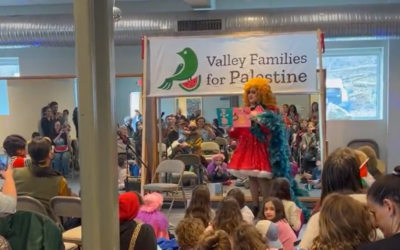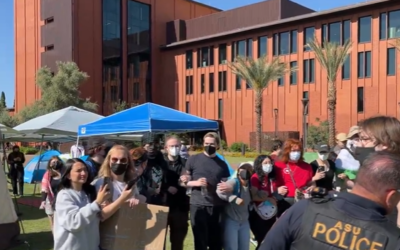By Corinne Murdock |
Arizona State University (ASU) and the State Department have teamed up to train students to become disinformation specialists.
The new program, announced on the 22nd anniversary of 9/11 on Monday, is part of a globalist effort to unify government response to disinformation.
ASU will partner with the State Department’s European Digital Diplomacy Exchange (EDDE) program to produce a new class coming in the spring, “Democratic Resilience in the Digital Age.” ASU students will collaborate with both State Department leaders and representatives from 21 different European governments to develop content for press briefings and government social media accounts.
EDDE was created by the Slovenian government’s Centre for European Perspective (CEP) and the State Department in October 2017. The State Department funds EDDE, while CEP executes it. One of EDDE’s co-founders and directors, Matthew (Matt) Jacobs, is an ASU alumni who has worked in the State Department since 2013. Assistant Secretary of State for Global Public Affairs Bill Russo credited Jacobs for making the initiative possible.
Russo told State Press that ASU was “fertile ground” for foreign affairs and creating “a pipeline of talent” for State Department hires. Russo dismissed concerns that the partnership would be influenced by government interests.
“What we [the federal government] are offering here is independent and rigorous research that is not influenced by the U.S. government,” said Russo.
In EDDE’s most recent guide published last summer, the program outlined a four-step approach for how governments should handle disinformation: compiling a database documenting disinformation by identifying its sources and collecting occurrences of it; creating media campaigns and a call-to-action network among government officials to uniformly counter disinformation; investigating those who repeatedly disseminate disinformation and enacting policies against them, such having social media platforms label them as disinformation spreaders; and punishing those who spread disinformation with hate speech bans, sanctions, and country bans.
EDDE also suggested certain tactics for gaining government trust online, such as issuing informal or trendy content. EDDE also suggested amplifying citizens’ content to create positive feedback loops between the government and citizens.
“Occasional, intentional ‘off-brand’ messages should be strategically deployed to maintain interest of, amuse, delight, or even surprise audiences and make them take action,” stated the guide. “By differing somewhat from government messaging, this type of content is more likely to be perceived as independent and credible by those who are suspicious of the government and may move them closer to the government than they were before encountering a partially-aligned message from a non-government communicator.”
EDDE has trained and advised over 200 high-level government representatives across 19 different countries since its founding, furthering the establishment of a globalist network on information warfare. EDDE announced its recent approval for a three-year renewal earlier this month.
“Participants consistently recognize EDDE as a platform for fostering productive regional cooperation, transcending borders to achieve common goals,” stated EDDE. “EDDE achieves these goals by developing and enhancing national-level digital strategic communication strategies and counter-disinformation policies, not only bolstering public trust in government communications but also combatting the influence of disinformation.”
As part of their renewal, EDDE received another $500,000 last month from the State Department to produce “shared, substantive global outcomes” through September 2025. To date, EDDE has received over $1.2 million in federal funding since 2018.
From March through November of last year, $21,500 of that federal funding went toward establishing a joint counter-disinformation campaign concerning the Russia-Ukraine war.
In 2020, the U.S. Bureau of European and Eurasian Affairs Office of Public Diplomacy (EUR/PPD) used EDDE to develop COVID-19 safety information and contract-tracing apps for governments provided by tech sector leaders including Google and Apple.
In its 2023 annual performance plan, the State Department declared a performance goal, “Demand for Democracy,” to establish a five percent increase in citizen ability to counter disinformation and propaganda by Sept. 30, 2026. “Disinformation” wasn’t mentioned in the department’s prior annual plans.
The goal was expanded in the department’s 2024 annual performance plan. As part of this expanded goal, the State Department expressed its intent to host the 2027 World Expo in the U.S. and establish a three-country study on Media Literacy training programs.
The department credited their novel focus on disinformation to President Joe Biden’s Presidential Initiative for Democratic Renewal declared during the 2021 Summit for Democracy.
The State Department is currently undertaking an evaluation activity, “Measures to Limit the Spread of Disinformation and Shape the Information Environment Cases Outcomes Meta-Assessment” through December. The evaluation by the Global Engagement Center (GEC) — an entity established by former President Barack Obama and refined by Arizona’s late Senator John McCain — pertains to the department goal of confronting the rise in “global disinformation” and its negative effects on domestic security and prosperity.
Approaches within this assessment include “digital and media literacy training; fact-checking, labeling, and nudges; factual and positive messaging, information campaigns, and pre-bunking; training and capacity building; independent media support; open-internet access tools; and detection and monitoring efforts.”
The State Department conducted two evaluations similar to the ongoing evaluation from September 2020 to February 2022 and March 2021 to December 2022, respectively, called the “Media Literacy Program (Eastern Europe and Eurasia) Evaluation” and the “Media Literacy Training Evaluation.”
Corinne Murdock is a reporter for AZ Free News. Follow her latest on Twitter, or email tips to corinne@azfreenews.com.








